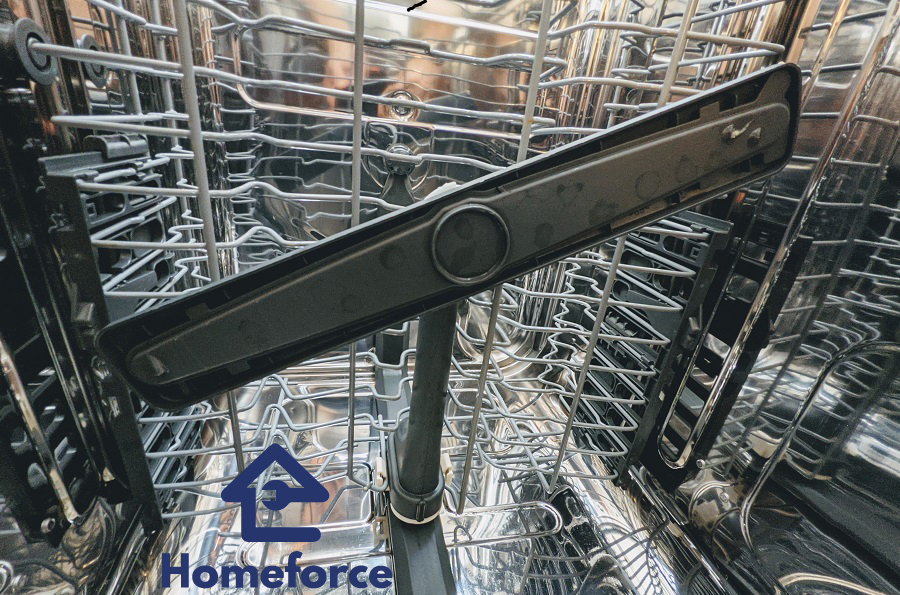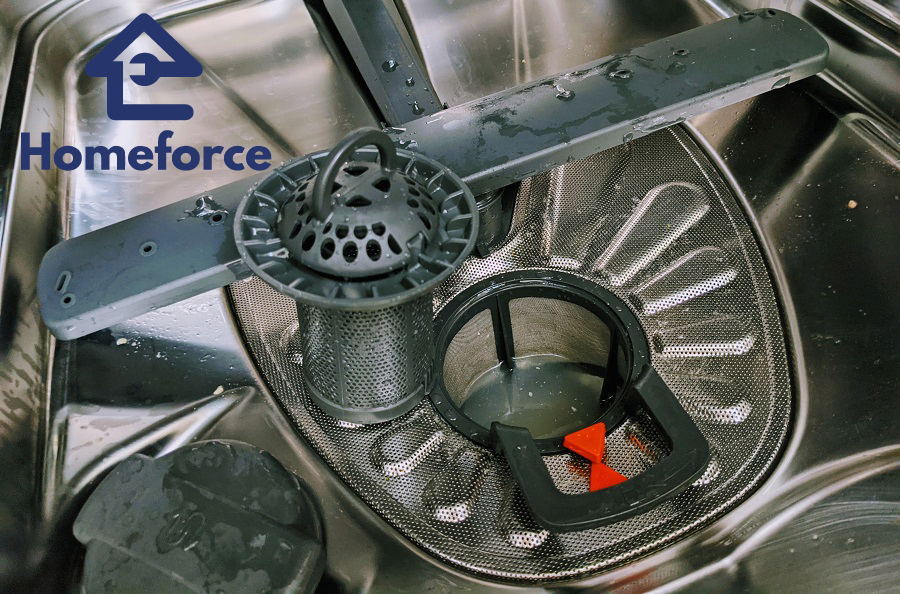Written On
Thu 18th November 2021
Written By
Homeforce
Category
Guides
Share This
Maybe you’ve had it for a few years now and it’s starting to show its age, or maybe you’re setting up your shiny new kitchen appliance for the very first time.
In any case, it can be incredibly frustrating when it doesn’t work as expected – refusing to turn on, refusing to start, filters clogged, dishes coming out still dirty, discoloured or even damaged, and so on.
In this article, we’ll discuss how to troubleshoot various issues your dishwasher may have and get it back to working order yourself.
Of course, the most reliable solution is to have your appliances covered by Homeforce! We are specialists in the repair and maintenance of your household appliances, boiler and plumbing.
With our Homeforce Plumbing and Heating Plan, you’ll never have to worry about your dishwasher breaking down again. Get in touch with our friendly customer care team who understand that your home is more important than ever.
That said if you’re determined to have a crack at it yourself first, keep reading for the best tips to get your dishwasher up and running and let’s see what we can do to help.
Get your manual ready
When in doubt, consult the instruction manual that came with your appliance. Throughout this article, we may ask you to check your model’s manual for specific details that can vary from one model to the next.
If you’ve lost the manual, don’t worry! As with most appliances these days, you can easily download a copy for free from the manufacturer’s website.
If you have a Beko dishwasher, simply go to Beko’s Appliance Manuals page and search for your model number.
Other manufacturers will have a similar search tool or directory you can look through.
If you don’t know what your dishwasher’s model number is, try looking for it on the sides of the unit.
Examples of model numbers for Beko dishwashers are DFS05020 and DEN59420D, but keep in the mind the exact format will vary between manufacturers.
Your manual will most likely have a “Troubleshooting” section which will cover much of the same points as you’ll see in this article, though in more terse language.
My Beko dishwasher won’t start
Sometimes you can spend half an hour fiddling with various components of something only to find it was something as simple as the power plug is loose.
The first thing to do when your dishwasher won’t start is to check that the power cable is plugged in properly and that the power outlet is switched on.
Make sure you’re definitely pressing the right button, typically labelled “On/Off”.
It could also be an issue with the fuses in your house, so consider checking for problems there.
Keep in mind that the machine will refuse to start a wash programme if the door is open, even if only slightly ajar. So, make sure the door is fully shut before trying to start a wash programme.
My dishes are coming out still dirty or not dry
This is an especially frustrating issue because there are quite a few things that can potentially be causing this to happen.
Left unresolved, you can end up spending more time re-washing dishes by hand in the sink, or losing hope and not bothering to use the dishwasher at all, which is probably not what you had in mind when you got it!
Loading your dishes optimally
One of the simplest explanations is that you might not be placing your dishes in an optimal fashion into the machine.
There’s a good reason there are different racks and compartments within the machine, and it’s worth reading the relevant part of your manual to see how best to load your dishes into them.
Make sure that the racks and baskets are not loaded excessively with dishes before starting a wash programme.
Sometimes you’ll need to select a programme with a higher temperature and cycle time to get your dishes properly cleaned. Experiment with different programmes on your dishwasher to see what works best.
Impellers
The impeller is the spinny part of the pump that sprays water during a wash cycle. Some models have two impellers, one for spraying and one for draining.

If an impeller is stuck for whatever reason, that will mean your dishes aren’t being washed properly. Before starting a programme, try turning the impellers by hand to ensure they are rotating freely.
Additionally, the upper and lower impeller holes may be clogged with food remnants such as lemon pips. If the impellers are cleaned regularly, this shouldn’t be an issue.
Filters
Another component that is prone to clogging is the filters. Get in there and check that the filter system is clear of food debris and, as with the impeller holes, make sure to clean it regularly to prevent such issues in the future.
If the filters are not installed correctly, that could also be the source of the problem.

Detergent
If you’re using powder detergent, make sure you’re storing it in a dry place and ideally in a closed container. Otherwise, humidity can make it ineffective.
Also, make sure you’re putting enough powder into the machine before starting a programme. Adjust and experiment with different amounts until your dishes are coming out clean again.
You might like to consider using tablet detergents instead, which don’t suffer the same humidity problems and you know you’ll have the optimal dosage per wash cycle every time.
Lastly, it may be that the detergent dispenser lid is left open. So just check that it’s closed tightly before starting a wash programme.
Rinse aid
The last thing to try if your dishes are not coming out clean is to check the rinse aid level. Look at the rinse aid indicator and adjust the level as described in your machine’s manual.
Lime traces and misty glassware
If you find lime traces left on your dishes after a wash or that your glassware has a misty appearance, there are a few possible causes.
It may be that the rinse aid is not sufficient, so check the rinse aid indicator and adjust as described in your manual.
Another possibility is that the water hardness setting is too low or that the salt level is insufficient. In that case, you can measure the hardness of your water supply and adjust the water hardness setting on your appliance accordingly.
Finally, you might have salt leakage causing this issue. While adding salt, be careful not to spill any around the filling hole and double-check that the salt reservoir lid is closed tightly afterwards.
To remove existing spilt salt from the machine, run the dishwasher empty on a prewash programme. After doing so, the lid may loosen due to salt granules dissolving under it, so check it again after the programme is completed.
Salt leakage is also a possible cause of deterioration and oxidation of metal surfaces of pots and utensils.
Dishes are scratched or damaged
This could be due to salt leakage or water hardness issues as described above.
It could also be because the machine was not loaded properly.
My dishwasher smells weird
Brand new dishwashers can be expected to have a strange odour at first, but it’s nothing to be worried about as it will fade after a few washes.
Otherwise, it may be that the filters are clogged.
Also be sure not to keep dirty dishes loaded in there for more than 2 or 3 days, as that is sure to create a bad smell coming from the machine.
There’s detergent left in the dispenser after a wash cycle
This might be because the dispenser was damp when you added detergent. Make sure it’s dry prior to filling.
There’s water left in the dishwasher after a wash cycle
Check that the filters are not clogged. The filter system should be cleaned regularly to ensure this does not become an issue.
It could also be that the discharge hose is clogged. Check your manual for details on how to service this component.
I’ve tried it all and nothing works!
You’re at the end of your rope and just can’t work out why your machine isn’t working. We understand your struggle, which is why we at Homeforce have over 10 years of experience protecting UK homes against unexpected faults, breakdowns and other costly repairs.
When your appliances are covered by our appliance Plan, our qualified engineers will be on hand to solve any dishwasher problems that may arise. Get in touch today and talk with our friendly customer care team understand that your home is more important than ever.